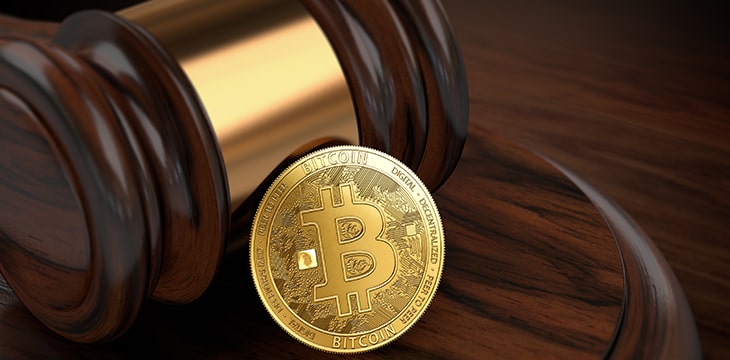|
Getting your Trinity Audio player ready...
|
News broke out that BSV Claims Limited had brought a £9.9 billion class-action lawsuit against digital currency exchanges Binance, Kraken, Shapeshift, and Bittylicious.
The collective proceedings order, which is the U.K. equivalent of a class-action lawsuit in the United States, accuses the exchanges of colluding to delist BSV without good reason, reducing, preventing, and distorting competition in the U.K. as a result.
The suit is brought on behalf of approximately 240,000 BSV investors and is being led by Lord David Currie of Marylebone, the inaugural Chair of the Competition and Markets Authority. He said he wanted to play a role because the BSV investors “deserve to be protected from anti-competitive behavior” and to “demonstrate that competition law applies in the sphere of crypto assets in the same way that it does to other economic activities.”
What does this mean for digital currency markets in the United Kingdom?
This lawsuit comes amidst a wave of regulatory crackdowns across the world. Just recently, the SEC accused Coinbase (NASDAQ: COIN) of listing unregistered securities, prompting Binance U.S. to delist some currencies quickly. In the U.K, the Law Commission recommended the creation of a new category of personal property to protect the rights of digital asset owners.
The BSV investors’ lawsuit is the latest in a long line of actions that prove existing laws, including those related to property ownership and free and fair competition, apply to an industry that has until now been all too keen to pretend it exists outside of them.
What does this mean for the U.K. markets specifically? It indicates that rogue operators will be penalized, regulations will provide a safe, consumer-friendly environment to own and trade digital currencies, and free and fair competition will finally flourish.
The U.K. has form here: it created world-class iGaming and financial services industries by taking the same approach, and both play significant roles in its economy today. Indeed, the U.K. has stated that it intends to be a global hub for digital assets, and demonstrating that anti-competitive behavior will not be tolerated is one step in the right direction in that regard.
What does this mean for the exchanges concerned?
While this lawsuit is a great thing for the United Kingdom and will demonstrate that it is committed to providing a level playing field for innovation, the picture doesn’t look so great for the four exchanges being sued. Each of them has a dubious history, and the last thing any of them will want is regulators looking into their internal processes, such as how they decide to list or delist digital currencies.
What sort of behavior justifies the claim that these exchanges have dubious histories? Binance has a long history of jurisdiction hopping to avoid regulators, which eventually led more than a few U.K. banks to block payments to the exchange. Kraken was fined $1.25 million for offering illegal digital assets without filing with the CFTC. Its CEO, Jesse Powell, has publicly aired his contempt for the law on more than one occasion. As for Shapeshift, its founder Erik Voorhees is an anarchist who opposes any and all regulation of the digital currency markets, and the firm failed to stop mass amounts of tainted BTC from being moved onto its exchange in the past.
Clearly, the activities outlined above will not be tolerated any longer. Will these exchanges adapt and start playing by the rules laid down by regulators? Binance has shown some willingness to do so, but Shapeshift and Kraken are led by ideological radicals and are thus unlikely to pivot to the more regulated environment. As the regulatory noose tightens, they’ll likely go down fighting.
Is the BSV investors’ lawsuit likely to be successful?
In a word, yes. The fact that the very first Chairman of the U.K.’s competition regulator thinks there is a case speaks volumes. On top of this, there was likely collusion in the BSV delisting attack is plain for all to see. All of the entities being sued acted within a few days of one another, publicly stating their intentions to delist BSV on social media. That’s evidence that can be used against them.
The great ‘crypto cleanup’ has begun
The BSV investors’ lawsuit is just one of many signals that the Wild West era of the digital currency industry is over. It’s now clear to everyone that libel will not be tolerated, AML/KYC regulations will apply industry-wide, and delisting digital currencies just because you have a grudge against prominent figures in a given ecosystem will have consequences.
While the so-called ‘crypto’ anarchists and extremists who dominated and controlled the industry in its infancy will yell and protest as the regulators come knocking, the fact is there’s no stopping this inevitable process, and as loud as they may yell, their reign is over. A new era of utility, value, and technological progress is dawning.
The great ‘crypto’ cleanup has begun, and this class action on behalf of BSV investors will play a pivotal role. Once again, the U.K. is taking the lead in regulating an emerging industry with massive potential. Rest assured, other regulators will be watching.

 02-21-2026
02-21-2026 




